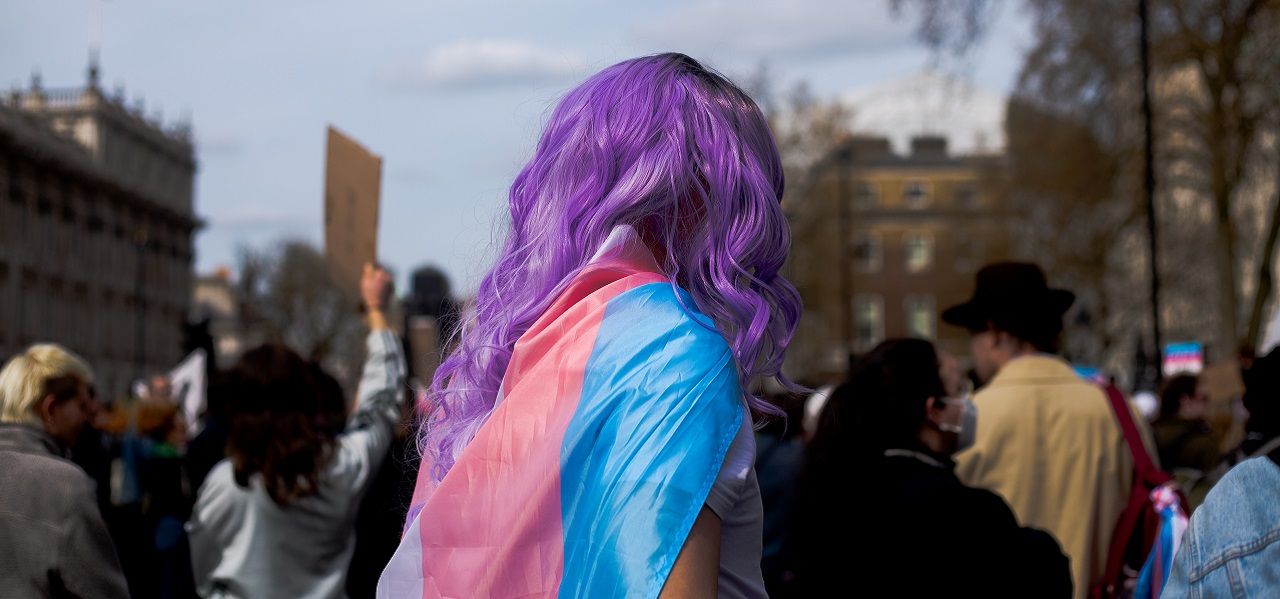Joyce activated, issue 19
A guest post on a precedent-setting legal case concerning a trans-identified prisoner, prosthetic sex aids and the heinous sin of “misgendering”. By Naomi Cunningham of Sex Matters and Legal Feminist.

This issue is a guest post by Naomi Cunningham, a barrister who specialises in equality and employment law. Naomi is chair of Sex Matters and a member of the for Legal Feminist collective. I’m delighted to provide a home for this piece, and have put this issue in front of the paywall to ensure it’s read as widely as possible. Next week I’ll conclude the analysis of philosophical arguments for the proposition Trans Women Are Woman that I started in the previous issue.
If you’re not already signed up for notifications of free posts and would like to be, you can sign up here. Or subscribe to read all past editions, and receive new ones weekly, by clicking below.
Green v Secretary of State for Justice and the heinous sin of “misgendering”
In Green v Secretary of State for Justice [2013] EWHC 3491 (Admin), the claimant sought judicial review of the prison authorities’ refusal to supply him with items he said were necessary to enable him to “live as a woman”. He said that he was transgender, and the prison was acting in breach of the applicable policy, and discriminating against him on grounds of his gender reassignment.
The High Court dismissed the application, finding that, since Green was male, and no other male prisoner would have been supplied with the items he sought, he was not treated less favourably than a hypothetical comparator without the protected characteristic of gender reassignment.
The judgment is significant for its discussion of the correct comparator in such cases, but that is not what I want to write about here. Instead, I want to focus on the language the judge uses.
The facts
The claimant is a man who was convicted under his birth name of Craig Hudson for his part in the protracted, sadistic murder of his wife. By the time of the proceedings in question, he had changed his name by deed poll to Kimberley Green, but he had not obtained a gender recognition certificate, so he remained legally a man for all purposes. He did not have a diagnosis of gender dysphoria, and his claimed transsexualism appeared to be “of recent origin”. It is noted in the judgment that he appeared to be saying different things to different people.
The items that Green said he ought to be supplied with are described in these terms at paragraph 35 of the judgment:
a wig.., an intimate prosthetic; padded bra; tights; concealer make-up; sanitary towels; adequate hair removal products; access to outsize shoe and clothing specialist retailers.
The expression “intimate prosthetic” is a reference to prosthetic breasts and a prosthetic vagina.
The language of the judgment
The judge thanks counsel at paragraph 3 for the “sensitive and helpful” manner in which they have conducted the case, and the language of the judgment is itself elaborately sensitive to Green’s feelings. It uses feminine pronouns for him throughout, apart from a single introductory instance at paragraph 5:
The claimant is a man, but for the purposes of this judgment I shall refer to him in the female gender as she has changed her name by deed-poll from her birth name of Craig Hudson.
The judge shies away as far as possible from the concrete details of what Green was demanding. For example, at paragraph 20, enumerating the things he was complaining about, the judgment says:
No access to certain prosthetic devices (designed to aid the intimate appearance of a woman – it is unnecessary to be more graphic than that).
I take issue with the judge’s “it is unnecessary to be more graphic than that”. It is necessary to be graphic. To do justice to the women affected by the demands of trans-identifying males, we need to know – and to face squarely – what we are dealing with.
So let’s think about the nature of Green’s “need” for a prosthetic vagina. What was it for? Are we to understand that he wished to wear it all day, every day, in order to achieve “the intimate appearance of a woman”? Why? How could it matter what his “intimate appearance” is? He is imprisoned, so there will be no-one to whom his intimate appearance should be relevant. In any case, how visually convincing do we think a prosthetic vagina is likely to be? Supposing that for some reason anyone else saw it while Green was wearing it, do we think they would be deceived by it for a nanosecond?
What does a man wearing a prosthetic vagina do with his penis? Presumably – if “the intimate appearance of a woman” is what he is striving for – he is “tucking”. But he will presumably have to untuck to urinate, so he is not going to be able to maintain the appearance, even to his own eyes, for extended periods. This device cannot possibly be thought to assist the man who wears it in persuading himself that he is really a woman: the inevitable discomfort will, on the contrary, keep him perpetually in mind of the very sex organs he claims he wishes to forget.
To anyone who is not too squeamish to consider the concrete realities, it should be obvious that the prosthetic vagina Green claimed to be entitled to was a sex aid, or more precisely, a masturbatory aid. I do not know exactly how it was to be used. I don’t know whether a man alone in his prison cell with a prosthetic vagina would be more likely to masturbate into it; or put it on, look at himself in the mirror and masturbate; or wear it for extended periods in order to maintain a state of semi-arousal.
But what I do know is that none of this has anything to do with “living as a woman”. This is the point at which transsexualism folds seamlessly into autogynephilia: if you are willing to countenance the possibility that living as a woman entails donning a prosthetic vagina, you have lost the ability to distinguish between a woman and a blow-up sex doll.
“Misgendering”
The attentive reader will have noticed that I have consistently “misgendered” Green in this blog; and the reader both attentive and astute will have guessed that this is not an accident.
The pronouns question is one of the most elaborately fortified and defended fronts in the gender wars. Even inadvertent infractions by known “allies” are savagely punished, as the actor Jameela Jamil has recently learned to her cost (sceptic Steven Knight’s analysis on his Substack is a joy to read). Maya Forstater’s defence of her accidental “misgendering” of Gregor Murray, a campaigner who asserts a “non-binary” identity and insists on the pronouns they/them (Forstater forgot this and referred to him with male pronouns), was one of the main pieces of evidence relied on by the original employment tribunal that held, erroneously, that her gender-critical belief was “not worthy of respect in a democratic society”.
This zero-tolerance strategy has been successful. In most of polite society, it’s treated as intolerably disrespectful to decline to use the preferred pronouns of anyone who has declared them. The Equal Treatment Bench Book, a guide for judges that purports to ensure they run hearings in a non-discriminatory fashion, says this:
Everyone is entitled to respect for their gender identity, private life and personal dignity. In the case of a trans person, it is a matter of common courtesy to use the personal pronoun and name that they prefer.
The Bar Standards Board, which regulates barristers, has issued draft social-media guidance in which “misgendering” is given as an example of misconduct. In some countries it can already be treated as a criminal act.
How has this come about? No-one expects atheists to address priests as “Father”. If I insist that I am the Pope, my professional body won’t threaten to discipline colleagues who refuse to address me as “Your Holiness” or to refer to me in court as “her Holiness, my learned friend”. The law won’t support my right to have others respect my claim. And yet if a man says that he is a woman and I decline to refer to him as “she”, there will be gasps of horror, complaints that I am showing myself to be a vile bigot, threats of professional discipline – even, depending on the circumstances, the potential involvement of the criminal law.

There is a cognitive cost in using preferred pronouns. I know this, because it is a cost that for a while I was willing to pay out of courtesy to trans-identifying males, even in their absence.
I also know what my own strategy was for limiting the cognitive cost, and managing the risk of an accidental “misgendering”: I used to make a genuine effort to think of trans-identifying males as women. It’s easier that way: you can continue to use pronouns more or less automatically if you determinedly kid yourself that the obviously male Agnes is a woman. If you let yourself know that Agnes is a man, you have to remember each time you refer to him that he is a man for whom the usual rule about pronouns doesn’t apply. So you do one large task (recategorise Agnes as female) instead of a multiplicity of small tasks (remember each time you refer to Agnes that he is a man of whom you’re supposed to use “she”).
I didn’t consciously choose this strategy: I slipped into it as the path of least resistance. I only noticed what I’d been doing when I stopped doing it: when I stopped using preferred pronouns, my perceptions of trans-identifying males sprang back to reality. My submission to preferred pronouns had started rewiring my brain.
I think the judge’s sensitivity and delicacy in Green allowed him to swerve around the nature of Green’s demands. Those demands were rightly refused in the result, but they were treated by the court with far more respect than they deserved. That was in 2013. Many comparably shocking demands of transactivists have been met since then. In 2022, a man is chief executive of Edinburgh Rape Crisis Centre, police forces assert the entitlement of male police officers to conduct “same-sex” searches of female suspects and the NHS treats women who ask for same-sex care as bigots.
There will be many more legal disputes of this kind, in which the demands of men who identify as women – for a variety of reasons, but some unknown proportion of them as sinister and abusive as Green’s – clash with the rights of women.
It’s urgent that we reclaim reality: not only our own right to speak the truth plainly, but also for our right to have these cases heard impartially by judges who are not distorting their own language to the detriment of their ability to reason.
By Naomi Cunningham
I hope you’ve enjoyed this free guest post. Please forward it to anyone you think would enjoy it. If you’d like to receive all issues, you can subscribe above.